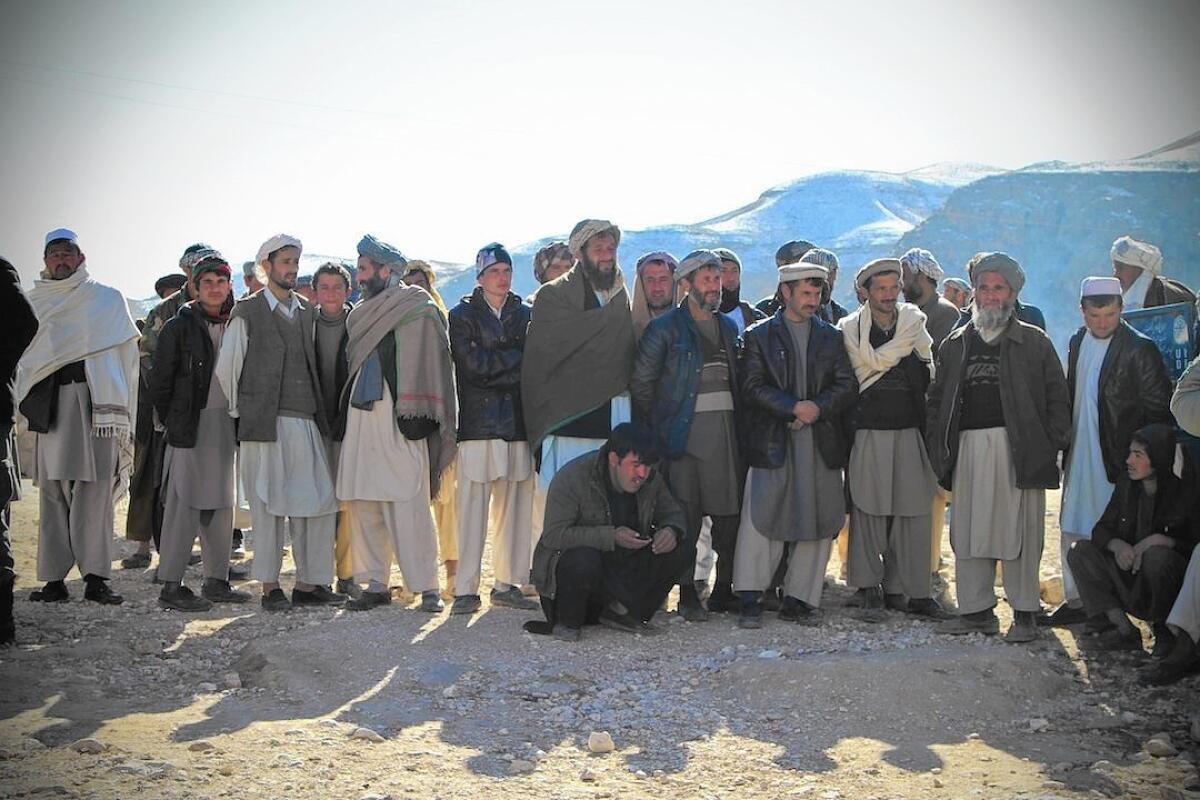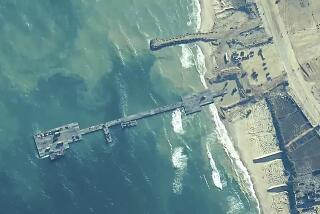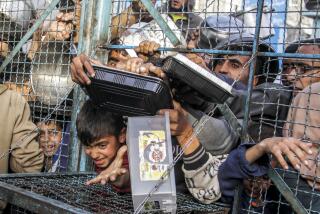Afghanistan’s first lady steps into public eye with rural aid effort

Reporting from Ruyi Du Ab, Afghanistan — To reach this remote district, a nine-person team from the Afghan presidential palace recently drove across rough, mountainous terrain where rock-covered paths turned to icy roads that repeatedly pushed their Toyota pickups to their limits.
When they reached a high school in Ruyi Du Ab, a two-hour drive from the capital of the northern province of Samangan, hundreds of men lined up to receive flour, sugar, rice, cooking oil, dates, blankets and rugs.
The community was still reeling from floods in the spring that left the largely agricultural area devastated. Farmers watched their crops and livestock wash away in the surging waters.
“There are families that didn’t even have a single drinking glass left,” one resident said.
An effort spearheaded by Afghanistan’s new first lady, Rula Ghani, to get relief supplies to thousands of families as Afghans face winter has focused on remote areas where geography, climate and insecurity often hinder international aid efforts.
It is one of the first major projects undertaken by Ghani, who has said she wants a more public role than many of her predecessors, including Zinat Karzai, a gynecologist who was rarely seen in public.
In a country where most humanitarian assistance is distributed by the United Nations and Western aid agencies, Ghani’s relief effort was funded by a $2-million grant from Saudi Arabia, part of a $130-million aid package that the government in Riyadh offered to Afghanistan during President Ashraf Ghani’s visit in October.
Although President Ghani’s administration has yet to decide on a Cabinet, the first lady’s aid delivery was in part a way to show that the Afghan government could serve the country in ways other than politics. Yet it also carries risks for the first lady, a Lebanese-born Maronite Christian who has not concealed her background, which could be used against the president by conservative critics.
The last spouse of an Afghan leader to have a prominent public role was Queen Soraya, the wife of King Amanullah Khan, who ruled Afghanistan from 1919 to 1929. Soraya was politically active, serving as the king’s education minister and joining his campaign against the conservative burka worn by some Afghan women.
For Ghani, who was active in charity work before her husband was elected president, the aid delivery was “an opportunity to not only reach the truly vulnerable but also for us to get a better sense of exactly what it takes to help those who find themselves in consistent need,” she said in an interview in her office at the presidential palace.
Ghani did not travel with the team, saying it would have required too much security and created a distraction. She followed the team’s progress from her office in Kabul.
“We purposely chose not to go to Kabul and other provincial capitals because we wanted to help those who rarely receive anything,” said Palwasha Amin, an Afghan American aide to Ghani who was involved in the effort.
Abdul Rahman, the 30-year-old headmaster of the Shahid Abdul Aziz school in Ruyi Du Ab, which served as the distribution site, said the aid package would last most families in this remote district no longer than a week. But he was hopeful it would persuade at least some of them to encourage their children to return to school in the spring.
Abdul Rahman said that more than 100 of his 800 students are consistently absent. The illiteracy rate in the province is estimated at 80%.
“When they turn 12, most of them stop attending altogether and head to Kabul to work as day laborers,” he said.
The Education Ministry used to provide students with free biscuits, which was an incentive to attend classes, but Abdul Rahman said that program ended more than two years ago.
Abdul Rahman said five earthquakes struck the province and caused some damage in 2014, and he was glad Ghani “at least thought enough of us to send a team to such a hard-to-reach area.”
Ghani’s efforts have not been without their critics. One lawmaker accused the first lady of ethnic bias and of overlooking Pashtun communities. Ghani’s aides counter that they have also sent 2,000 tents to Khowst, an eastern province that is dominated by Pashtuns, Afghanistan’s largest ethnic group. President Ghani is a Pashtun.
Amin said the team chose five districts in Samangan and Baghlan provinces that the U.N. Office for the Coordination of Humanitarian Affairs had identified as some of Afghanistan’s neediest. The districts are dominated by ethnic Uzbeks and Tajiks.
All the districts are at elevations above 6,500 feet. In Ruyi Du Ab, an area of mostly mud houses, few households have reliable electricity, especially at night.
Bismillah Khan, a 24-year-old literacy teacher, said he wished the deliveries had included firewood and coal. With 19 people in his family, Khan said, gathering sufficient firewood involved a daylong trek into the mountains.
Mohammad Tahir, 56, who spends much of the year working as a day laborer in Kabul, said coal was even harder to come by. About $10 worth of coal lasts his family at most 16 days, he said.
“Hopefully this will be only the beginning,” Haji Gol Mohammad, a member of Ghani’s team, told the crowd before he started to call the names of more than 150 people awaiting the goods.
Ghani described this year’s effort as a pilot project for what she hopes will be bigger Afghan-led aid efforts.
“I’m not a humanitarian,” said Ghani, who had worked on projects involving street children and displaced people in the capital, where she lived while her husband was serving in the government.
“I did this as a way to provide immediate assistance to the most vulnerable people in the country, but I want to use this project to help find long-term solutions so we no longer have entire populations suffering from the same problems year after year.”
During a week of deliveries, Ghani’s team constantly faced difficult decisions about sending pickup trucks known to be carrying representatives of the presidential palace into harsh terrain that sometimes bordered territory held by Taliban insurgents.
In the provincial police commander’s office in Baghlan, Amin and Gol Mohammad debated whether to risk the six-hour drive to three districts they had earmarked for aid or simply distribute goods in the capital, Pul-i-Khumri.
Amin called Ghani’s Kabul office and was told that people were there waiting for them to arrive with the supplies they’d been promised, so the team decided to stick with the original plan.
The message, Amin said, was: “We can’t disappoint them now.”
Latifi is a special correspondent.
More to Read
Sign up for Essential California
The most important California stories and recommendations in your inbox every morning.
You may occasionally receive promotional content from the Los Angeles Times.










